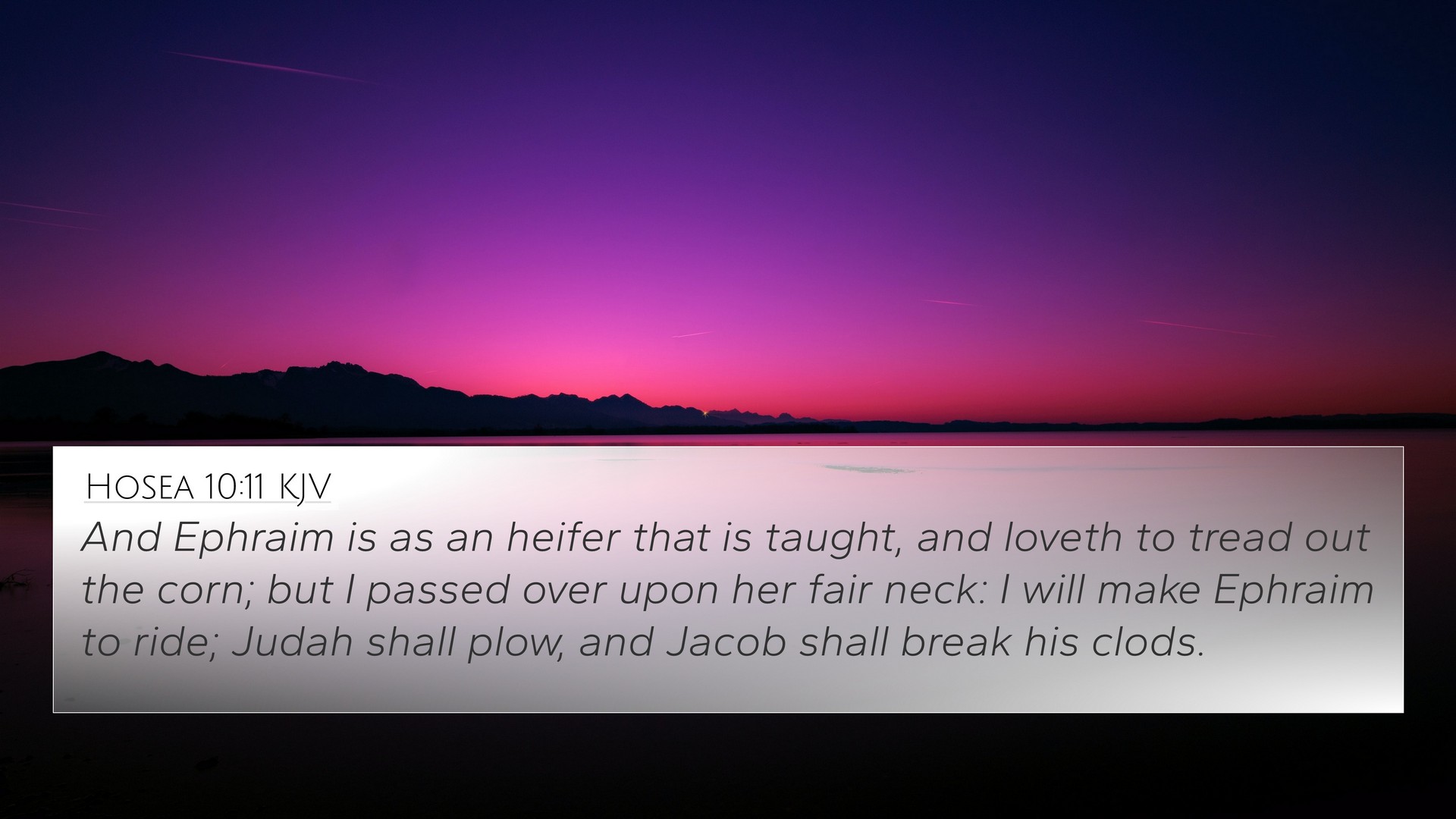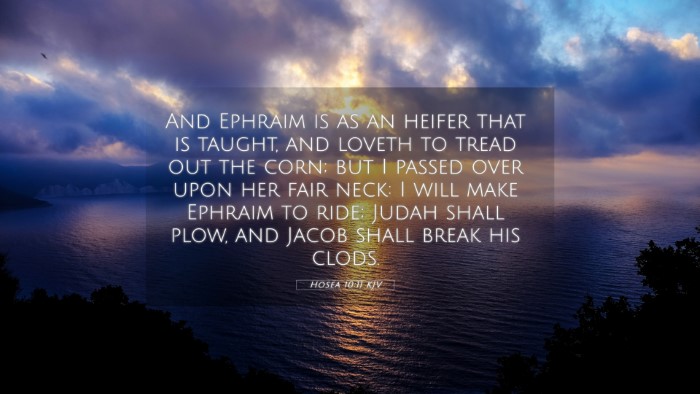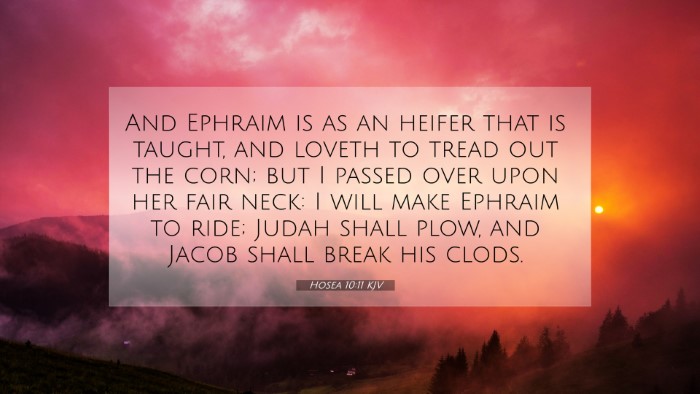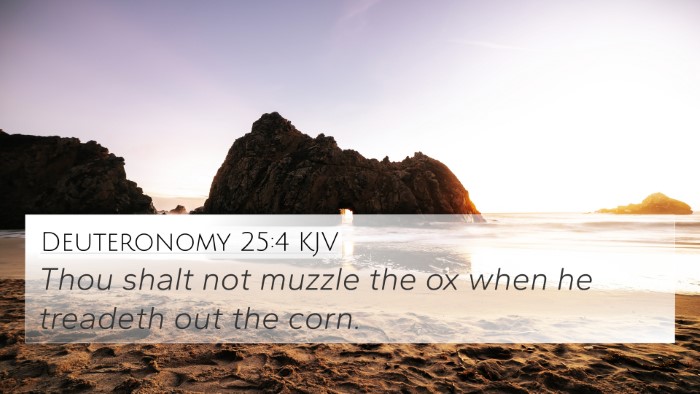Old Testament
Genesis Exodus Leviticus Numbers Deuteronomy Joshua Judges Ruth 1 Samuel 2 Samuel 1 Kings 2 Kings 1 Chronicles 2 Chronicles Ezra Nehemiah Esther Job Psalms Proverbs Ecclesiastes Song of Solomon Isaiah Jeremiah Lamentations Ezekiel Daniel Hosea Joel Amos Obadiah Jonah Micah Nahum Habakkuk Zephaniah Haggai Zechariah MalachiHosea 10:11 Similar Verses
Hosea 10:11 Cross References
And Ephraim is as an heifer that is taught, and loveth to tread out the corn; but I passed over upon her fair neck: I will make Ephraim to ride; Judah shall plow, and Jacob shall break his clods.
Uncover the Rich Themes and Topics of This Bible Verse
Listed below are the Bible themes associated with Hosea 10:11. We invite you to explore each theme to gain deeper insights into the Scriptures.
Hosea 10:11 Cross Reference Verses
This section features a detailed cross-reference designed to enrich your understanding of the Scriptures. Below, you will find carefully selected verses that echo the themes and teachings related to Hosea 10:11 KJV. Click on any image to explore detailed analyses of related Bible verses and uncover deeper theological insights.
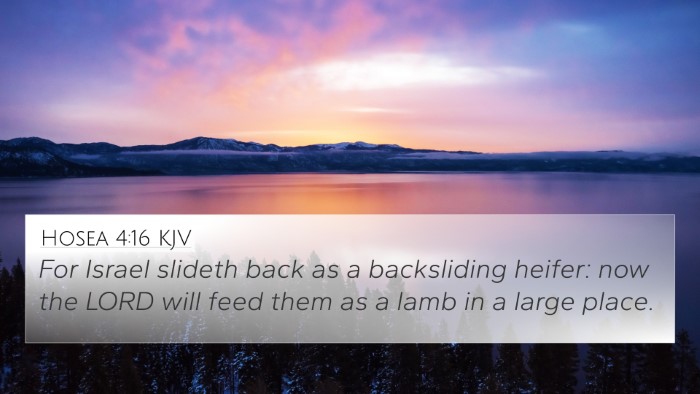
Hosea 4:16 (KJV) »
For Israel slideth back as a backsliding heifer: now the LORD will feed them as a lamb in a large place.
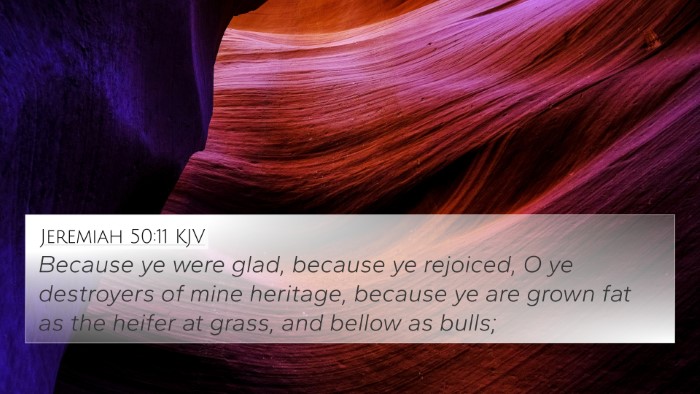
Jeremiah 50:11 (KJV) »
Because ye were glad, because ye rejoiced, O ye destroyers of mine heritage, because ye are grown fat as the heifer at grass, and bellow as bulls;
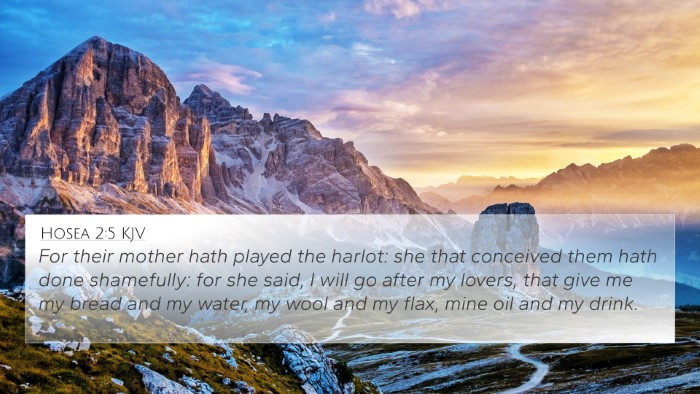
Hosea 2:5 (KJV) »
For their mother hath played the harlot: she that conceived them hath done shamefully: for she said, I will go after my lovers, that give me my bread and my water, my wool and my flax, mine oil and my drink.
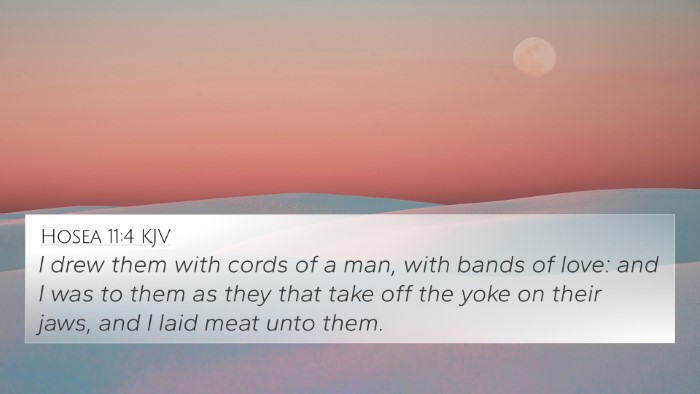
Hosea 11:4 (KJV) »
I drew them with cords of a man, with bands of love: and I was to them as they that take off the yoke on their jaws, and I laid meat unto them.
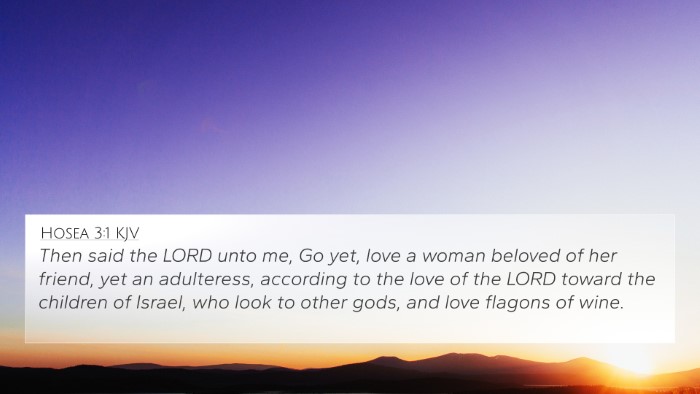
Hosea 3:1 (KJV) »
Then said the LORD unto me, Go yet, love a woman beloved of her friend, yet an adulteress, according to the love of the LORD toward the children of Israel, who look to other gods, and love flagons of wine.
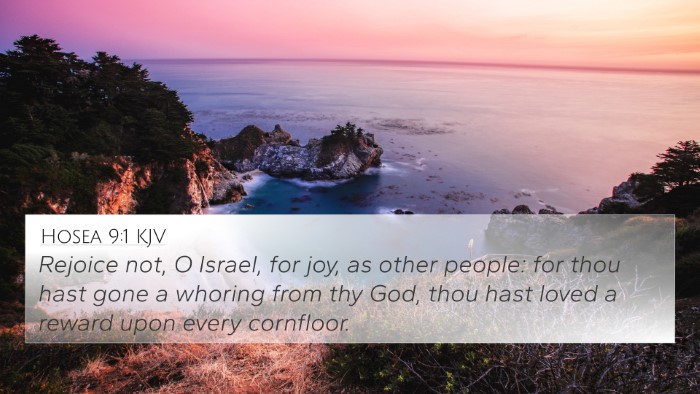
Hosea 9:1 (KJV) »
Rejoice not, O Israel, for joy, as other people: for thou hast gone a whoring from thy God, thou hast loved a reward upon every cornfloor.
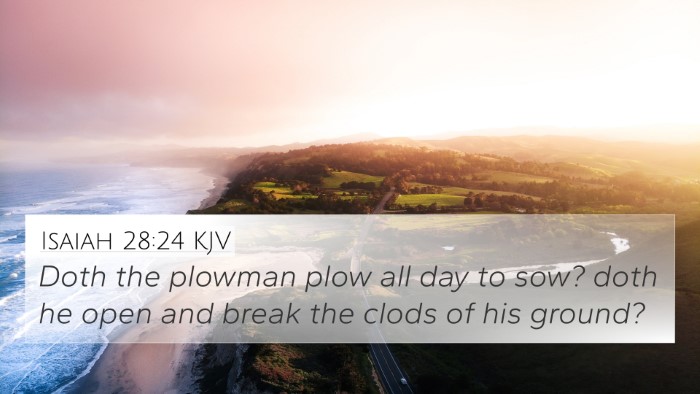
Isaiah 28:24 (KJV) »
Doth the plowman plow all day to sow? doth he open and break the clods of his ground?
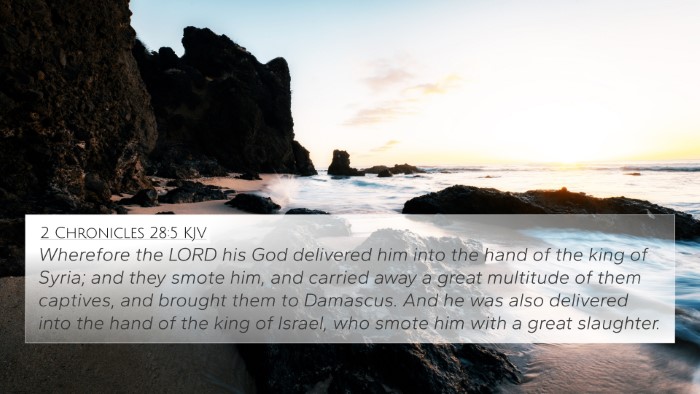
2 Chronicles 28:5 (KJV) »
Wherefore the LORD his God delivered him into the hand of the king of Syria; and they smote him, and carried away a great multitude of them captives, and brought them to Damascus. And he was also delivered into the hand of the king of Israel, who smote him with a great slaughter.
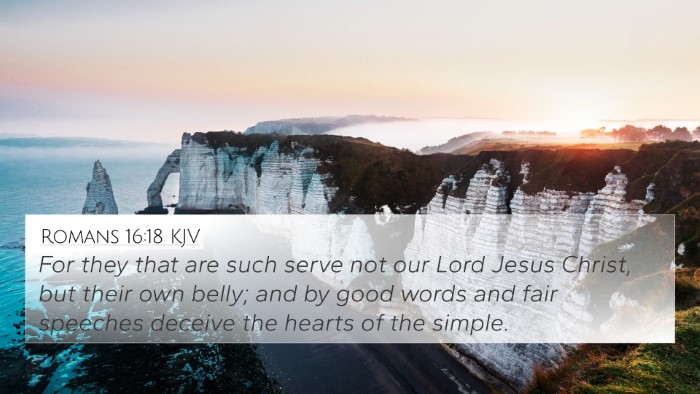
Romans 16:18 (KJV) »
For they that are such serve not our Lord Jesus Christ, but their own belly; and by good words and fair speeches deceive the hearts of the simple.
Hosea 10:11 Verse Analysis and Similar Verses
Understanding Hosea 10:11
The verse Hosea 10:11 from the Old Testament serves as a profound reminder of God's expectations and the consequences of disobedience. It reads:
"And Ephraim is as an heifer that is taught, and loveth to tread out the corn; but I passed over upon her fair neck: I will make Ephraim to ride; Judah shall plow, and Jacob shall break his clods."
Verse Breakdown and Meaning
This verse presents a vivid agricultural metaphor to illustrate the relationship between God and His people. Let’s break it down:
-
Ephraim as a Heifer:
The reference to Ephraim, a major tribe of Israel, being like a heifer signifies that they are young, strong, and capable, yet they are inexperienced and easily led astray.
-
Treading Out the Corn:
The act of treading corn represents enjoying the fruits of labor without responsibility or restraint. It indicates a tendency to indulge in pleasures without regard for God's laws.
-
God's Sovereign Intervention:
When it says, "I passed over upon her fair neck," it signifies God's authority and control. He is in charge of the destiny of Ephraim, reminding them that He can lead them in the right direction if they submit to Him.
-
The Call to Responsibility:
The directive that "Judah shall plow, and Jacob shall break his clods" indicates that there is work to be done. This contrasts the ease of Ephraim with the responsibility that others must take on.
Commentary Insights
Insights from renowned commentators provide depth to this verse:
-
Matthew Henry:
He emphasizes that the heifer symbolizes laziness in spiritual growth. Just like the young animal, Ephraim is indulging but unaware of the impending judgment.
-
Albert Barnes:
Barnes highlights the concept of discipline in this verse. He argues that God's judgment is a necessary means of correction, which the Israelites must learn to accept.
-
Adam Clarke:
Clarke points out the duality in God's message, emphasizing that although Ephraim enjoys the blessings, there are expectations attached to those blessings that they are failing to uphold.
Bible Cross-References
Understanding Hosea 10:11 may further be enhanced through cross-referencing with other biblical passages that share thematic connections:
- Isaiah 1:3: "The ox knows his owner, and the donkey his master’s crib; but Israel does not know, My people do not consider." - highlights a lack of understanding among God's people.
- Matthew 11:30: "For my yoke is easy, and my burden is light." - speaks to God guiding His people gently.
- Galatians 6:7: "Do not be deceived: God is not mocked, for whatever one sows, that will he also reap." - emphasizes the consequences of one's actions.
- Micah 6:6-8: "With what shall I come before the Lord, and bow myself before God on high?" - calls for a genuine relationship with God, emphasizing accountability.
- Jeremiah 4:3: "For thus says the Lord to the men of Judah and Jerusalem: 'Break up your fallow ground, and do not sow among thorns.'" - a call for repentance and a call to action.
- Proverbs 3:12: "For the Lord reproves him whom he loves, as a father the son in whom he delights." - signifies God’s loving discipline.
- Luke 9:62: "Jesus said to him, 'No one who puts his hand to the plow and looks back is fit for the kingdom of God.'" - the need for commitment and forward movement in faith.
Thematic Connections
Hosea 10:11 can be seen as part of a greater dialogue throughout the Bible. Various themes resonate as follows:
- God's Authority: The unwavering authority of God over nations and individuals, seen through His intervention in Ephraim's life.
- Divine Correction: The theme of God correcting His chosen people to bring them back to righteousness is prevalent.
- Accountability and Responsibility: Each individual and nation holds responsibility for acknowledging God's sovereignty.
Closing Thoughts
Hosea 10:11 captures the essence of a loving yet firm God who wants His people to understand their role and responsibilities. It also emphasizes that indulgence without accountability will ultimately lead to judgement. The cross-references and thematic connections present throughout the scripture deepen the understanding of Hosea's message within the broader biblical narrative.
